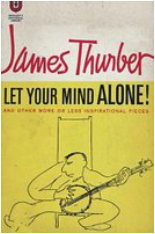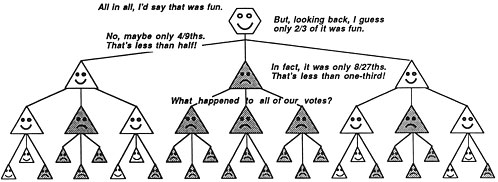|
Suppose we're in ancient times. I've mislaid the keys to my chariot. Where, where are my keys? No problem. I can pop a prayer to the deity of memory. Above in the tiled mural, the Greek goddess Memory with a pat on the head helps a mortal recall something. In this classic perspective, my self lives inside my body as a king in a castle. I meet at the castle's doors and windows such visitors as Memory, Prudence, Courage, and Cowardice. I can take their advice or reject it. This view persists today, that I am master of my house. But it is not the only view. The 2015 Disney/Pixar movie Inside Out portrays a radically different inner life than the solitary pilot of the classic imagination. The inner being of the 11-year-old girl Riley is a team of five emotions: Joy, Sadness, Anger, Disgust, and Fear. Memories manifest not via divine dope slap. Rather, memories are glassy balls that our valiant crew collects and routes to various shelves. I enjoyed Inside Out! I particularly liked how it portrayed Sadness as vital. I was surprised to find Disgust as one of the fab five, but Joy explains, "she basically keeps Riley from being poisoned— physically and socially." On checking her credentials, I found academic papers on Disgust as a universal emotion. Who knew? All of Riley's emotions—even almost-forgotten fantasies—have value to Riley and as players generally in human development.  Be warned: Inside Out has scary moments, stretches of emotional desolation, and misbehavior. These lead to encouraging family scenes in every respect better than the sum of any ten other Disney cartoons, but it's not an easy road. Pixar knows sad. To parents, I urge a head start, a preview, so as to fruitfully anticipate kids' concerns. Of its many ideas, I want to ride two trains of thought that rolled through Inside Out: emotions as a team, and how to find a memory.  What team inhabits your head? What team inhabits your head? Interior Teamwork Did you notice that the Inside Out emotions often fumble individually, yet together as a team succeed? Inside Out is a new example in the great tradition of ensemble shows. I wondered about omissions. Don't we need an analytic Science Officer or Professor on our ship? Where is the wise Captain or Skipper? How about Greed? Where is Love? But hey, it's a 95-minute cartoon. The engaging characters, sets, and action of Inside Out did not let me sustain such quibbles. I was pleasantly astonished with how much new territory Inside Out touched. With little exception, older head trips stick to first-person narrative, the classic self. Consider ensembles from Gilligan's Island to Seinfeld to Downton Abbey. I can playfully re-frame these as psychological parables. Inside Out strikes me as ground-breaking in that it explicitly identifies the inner me as a team. The movie dodges psycho-babble and instead makes clever use of familiar terms such as "train of thought" and "memory dump". This movie translates contemporary understanding of the inner and outer worlds into a story that kept my eyes smiling when they weren't a little moist. Though maybe not in movies, the idea of Team Me has been around a while. There's the scary incident of Jesus' encounter with the infested man who growled, "My name is Legion, for we are many." Walt Whitman observed, "Do I contradict myself? Very well, then I contradict myself, I am large, I contain multitudes." A formal architecture of an ensemble mind was floated in 1986 by the late Marvin Minsky in his elegant book, Society of the Mind. Minsky speculated that the mind might be the work of an army of purposeful “agents” much like software objects in a computer program. Perception agents on the front lines grab sights and sounds and pass back summaries to analyst agents, who confer with supervisor agents, archivist agents, and executive agents. Like an electoral system, this mental structuring might not always yield best conclusions. Despite fumbles, these simple but organized cybernetic agents can learn from their mistakes and can re-calibrate and re-group themselves to better handle challenges. The jury is out as to whether the mind really is organized as such a team. Nevertheless, computer scientists have run with the idea, programming societies of agents to build systems for recognizing faces, for language translation, and for air traffic control. The next time you visit Facebook or the airport, contemplate that a computerized committee of simpletons may be handling your transactions. Who's in charge? Focus a microscope or ponder an MRI. The brain reduces to molecules in motion. Maybe. We can pop the bonnet and poke systematically, and sometimes relieve tremors or reduce obsessive compulsive disorder. We don't for now expect to photograph Joy or Sadness.  1. Some venerable philosophies say that without the body, there is no mind or soul or anything else I can call "me." An array of dots on a screen is not Beyonce, but an entertaining image of her. Similarly, mind and soul are useful illusions emerging from biology. Such anthropological monism approximates the view of most Old Testament writers. Job is representative: "I know that my redeemer lives, and that in the end he will stand on the earth, and after my skin has been destroyed, yet in my flesh I will see God." The apostle Paul elaborates, "But someone may ask, 'How are the dead raised? What kind of body will they have?' Foolish person! When you sow a seed, it must die in the ground before it can live and grow. And when you sow it, it does not have the same body it will have later.... It is the same with the dead who are raised to life. The body that is planted will ruin and decay, but it is raised to a life that cannot be destroyed." 2. By contrast, the neighboring Greeks, many other religions, and many today assume that the body and self are separable. The body is just clothing, a chariot, or a house for the self. A recent wit snipped, "What is mind? No matter. What is matter? Never mind." This body/self dualism is a plausible conclusion from Jesus' story of the Rich Man and Lazarus: "Lazarus died, and the angels carried him to the arms of Abraham. The rich man died, too, and was buried. In the place of the dead, he was in much pain. The rich man saw Abraham far away with Lazarus at his side...." Tent-maker Paul observed, "We know that our body—the tent we live in here on earth—will be destroyed. But when that happens, God will have a house for us."  More Joy? Serotonin also makes you happy. Too little makes you sleepy. Too much brings diarrhea. More Joy? Serotonin also makes you happy. Too little makes you sleepy. Too much brings diarrhea. 3. A variation on dualism sees humans as having three parts: body, soul, and spirit. The soul identifies breath and life, an aspect shared with animals, and an aspect that can die. The spirit is a spark that can exist forever. "Don’t be afraid of people, who can kill the body but cannot kill the soul. The only one you should fear is the one who can destroy the soul and the body in hell." "For the word of God... penetrates even to dividing soul and spirit, joints and marrow; it judges the thoughts and attitudes of the heart." In this perspective, virtues are choices. “Dress in the wardrobe God picked out for you: compassion, kindness, humility, quiet strength, discipline. Be even-tempered, content with second place, quick to forgive an offense. Forgive as quickly and completely as the Master forgave you. And regardless of what else you put on, wear love. It’s your basic, all-purpose garment. Never be without it." The Message here really runs with the clothing metaphor suggested in the original language.  Instead of glowing grapefruits, memories use snowflakes such as this "CaMKII" molecule. These yield for the human nervous system over one hundred million gigabytes, perhaps a billion gigabytes of information. This does not consider 1.5 gigabytes of DNA and RNA memory in each cell, and mug shots of intruders that the immune system tracks. 4. The view of Inside Out and of much recent science holds that our inner self has many discernible parts not unlike software subroutines in a computer. Higher functions such as sadness light up several parts of the grey outer shell of the brain. My high school history teacher frequently misstated this as, "people use only ten percent of their brain, so there is plenty of room for presidents." Memory connections involve much of the unappreciated inner core of the brain. Connections are key. Without connections—an index to the hundred million gigabytes—searching for the memory of where I put my keys would take decades. My mind is full of clutter and competing interests. The apostle James does not paint a pretty Disney picture of the society of my mind. "What causes quarrels and fights among you? Is it not this, that your passions are at war within you? You desire and do not have, so you murder. You covet and cannot obtain, so you fight and quarrel." Ugh. Me as Game of Thrones. I suppose this is life for some people. In any case, there's more to me and to you than meets the eye. Taking my self to the afterlife used to involve a small boat. The modern journey needs a megabus. Our interior self resists reduction to a single metaphor. It is its own thing. One might fruitfully treat the self sometimes as the pilot of a ship, sometimes as a computer, perhaps as a courtroom or battlefield or small town, and sometimes as an ensemble of actors in a play. That reminds me: How long must we wait for the Broadway musical version of Inside Out? The Blu-Ray DVD of Inside Out offers a bonus peek at an early story plan. Riley ignores Joy's direction to frolic on the playground but instead chooses to chat with new friends. Goofball gives way to growth. By contrast, in the final cut of Inside Out, emotions generally get their way. Here is a practical question: do emotions control me or just advise me? Can emotions' influence vary with time and vary among persons? If you have doubts on this matter, ask an 8th grade teacher about hormone hurricanes, energy eruptions, sadness showers, quiz-time quivers, and other middle school meteorology.  Outside In Every day I lose arguments with myself. Compassionate Me says "be kind". Justice Me says, "be fair". Greedy Me says, "keep it". An intriguing experience in such self-debates is sometimes to receive an insight or proposition that I can't trace to any of myselves onstage. The actors glance around nervously. The work of a muse? The whisper of God's Spirit? Some phantom lurking in the wings? A mental disorder? Ebenezer Scrooge tries to brush off the invasive warnings of Marley's ghost with a materialistic explanation: “You may be an undigested bit of beef, a blot of mustard, a crumb of cheese, a fragment of underdone potato. There's more of gravy than of grave about you." Old pictures of moral deliberation show an angel or a demon whispering in one's ear. I haven't traced where it started, but more recent cartoon art makes the angel and the demon look suspiciously like the subject. This cute convention slams the door on the old Muses, the Holy Spirit, and the Tempter. Those voices you hear? They're in your head. In the movie, the main external voices are simply Riley's parents. Mixed Emotions On the inside, Riley's five emotions want the best for their girl but have conflicting ways to help Riley. They each elbow their way to Riley's control console, but Joy dominates Riley's buttons. Intriguingly, we see into the minds of other people. We see into the minds of animals. What do we find? The same fab five, Joy, Sadness, Anger, Fear, and Disgust. Different personalities arise from different boss emotions. For Riley's Dad, Anger calls the shots. For Mom, Sadness leads. Whew. Do emotions have emotions? Several things I didn't notice on first viewing: At the adult consoles, everyone has a seat. The teams show more cohesion. In these peeks, Dad-Anger is more nearly Decisiveness, and Mom-Sadness leads more as Empathy. Do emotions mature? Perhaps Disgust grows up to be... Discernment. Internal conflict defines the human condition but is painful in anyone's psychology. Paul in Romans chapter seven laments the division between the drive for gratification and the aspiration to do right. He identifies a cure from outside: “Although I want to do good, evil is right there with me. For in my inner being I delight in God’s law; but I see another law at work in me, waging war against the law of my mind and making me a prisoner of the law of sin at work within me. What a wretched man I am! Who will rescue me from this body that is subject to death? Thanks be to God, who delivers me through Jesus Christ our Lord!” James agrees with Paul and Proverbs that wisdom comes from outside, and notes responsibility: “If any of you lacks wisdom, you should ask God, who gives generously to all without finding fault, and it will be given to you. But when you ask, you must believe and not doubt, because the one who doubts is like a wave of the sea, blown and tossed by the wind. That person should not expect to receive anything from the Lord. Such a person is double-minded and unstable in all they do.” Memories: Received or Made? For the society of Inside Out, perceptions automatically record onto glowing orbs. The emotion in charge at the moment influences the new sphere’s color: gold for Joy, green for Disgust, violet for Fear, red for Anger, and blue for Sadness. True superficially to life, when Riley sleeps, the team sends the day’s accumulated memory marbles down to long term storage. These orbs can be recalled and their memories projected for the person. A few particularly bright memories define personality and remain in Headquarters for ready reference. Memories that are not recalled with sufficient frequency, memories with few connections, just fade and evaporate. The movie gets right a disturbing aspect of memory recently verified. Not only do emotions color a memory when the memory is created; but also what I feel during recall can change the hue of the original memory. To Joy’s dismay, when Sadness touches a bright gold memory ball, its gains a blue hue. A happy memory can become a longing for that pleasant past. An originally sad memory can become appreciation of the growth that resulted, or at least the better times now. Maturing memories are mottled. But let's face it. Some memories deserve to die, or at least to be tagged as toxic. These memories are never of natural events. They are sugar-coated microwave burritos of fabrications, lies, and well-fed biases. What should die is that chewing gum jingle. Die, you uglies of the interwebs! You insinuate into searches! You roll that trolls! Of course, despising some memories just strengthens them. We can't help but observe gossip, self-promotion, and hatred; but we can refuse to treat them as news, entertainment, and wisdom. Emotions such as Greed may have some value for survival, but can get out of hand. Destroying Greed is not the way. Displacing Greed with Generosity is usually a win. "Those who are stealing must stop stealing and start working.... Then they will have something to share with those who are poor." "But whatever gain I had, I counted as loss for the sake of Christ... But one thing I do: forgetting what lies behind and straining forward to what lies ahead, I press on toward the goal for the prize of the upward call of God in Christ Jesus." Disconnecting everything unpleasant can cripple. When Riley loses connection to her core memories concerning Friendship, Honesty, and Family, she faces an abyss of despair. For Riley's emotions, the valley of the shadow of death is not metaphorical and threatens to destroy the emotions before they can restore core connections. To recall a needed memory, rather than pursue an epic search through the hundred million gigabytes of my mind, I can do several things to secure worthwhile memories intact, connected, ready for quick recall. First, use it or lose it. As the winsome governess in The Sound of Music lilts, "When the dog bites, when the bee stings, when I'm feeling sad, I simply remember my favorite things, and then I don't feeeel so bad." Second, as Inside Out teaches, less pleasant memories can be vital to growth. Judiciously refresh these also. Embarrassing and even painful moments can be lessons learned. Third, for mass recall, one can exploit visual memory by contriving a Mind Palace. Thanks, Cicero and Sherlock. And yet better, be aware and thankful for the natural ingredients of life. Be alert for everyday things that help you appreciate God and people. Reflect. Practice an attitude of gratitude. Link new memories into a vast web of helpful memories. Connections strengthen both the new and the old. "Finally, brothers, whatever is true, whatever is honorable, whatever is just, whatever is pure, whatever is lovely, whatever is commendable, if there is any excellence, if there is anything worthy of praise, think about these things." I find it altogether genius that the Bible links the believer's core memories to eating food. For Jews, the elements of the Passover meal recall release from slavery and God's protection, family and nation. Later, Jesus took this same freedom meal with its mix of sadness and joy, and made it a serious celebration, an encouragement, an easily-renewed memory: "On the night when the Lord Jesus was handed over to be killed, he took bread and gave thanks for it. Then he broke the bread and said, 'This is my body; it is for you. Do this to remember me.' In the same way, after they ate, Jesus took the cup. He said, 'This cup is the new agreement that is sealed with the blood of my death. When you drink this, do it to remember me.'” "Talk amongst yourselves"
0 Comments
SOTM 16: A Call to Prayer
In our march through the Sermon on the Mount, we come to a passage today in which Jesus encourages those of us in the Kingdom of God to pray. I think He knows us—knows we don’t pray as much as we know we should—and He’s not surprised. After all, even His handpicked disciples and best buds couldn’t stay awake with Him and pray for an hour on his last night on earth. So, in this passage, Jesus is making some promises that could revolutionize our thinking, and with that, blow life into our prayer time. Let’s start with a look at these five verses: Matthew 7:7-11 - Ask, and it will be given to you; seek, and you will find; knock, and it will be opened to you. For everyone who asks receives, and the one who seeks finds, and to the one who knocks it will be opened. Or which one of you, if his son asks him for bread, will give him a stone? Or if he asks for a fish, will give him a serpent? If you then, who are evil, know how to give good gifts to your children, how much more will your Father who is in heaven give good things to those who ask him! Two things you should see right off the bat in this passage. One, we are to pray. The words, “ask,” “seek,” and “knock” are in the imperative mood, and that means these are not suggestions. They are directives. If we’re not praying, we’re living in disobedience to a specific command of Christ. Prayer must be pretty important from Jesus’ viewpoint. And we’re to pray all the time. Those same words are in the present tense, so anytime it is “Now” we are to be praying. Really, it’s just keeping the channel of communication open to God all the time. Ask, and keep asking; seek, and keep seeking, knock, and keep on knocking. All these things—ask, seek, and knock—imply that we have a need we can’t meet. We’ve got a recipe that calls for one more egg than we have, so we’ve got to ask. We’ve lost our keys and can’t find them, so we’ve got to ask someone to help us locate them. We can’t get through the door, so we’ve got to find a key or find someone with a key to get through that puppy. Our problem often is that we don’t feel a need. We think we can handle it. We don’t need any help. After all, we pride ourselves on being self-sufficient. Sometimes, to help us feel that need, God brings little things our way we don’t like in the form of trials, difficulties, problems, even crises. Even then, even as Christians, we’ll often try to claw our way through without asking, seeking, or knocking. Yet, we’re told in Hebrews 4:6 that we can approach God as followers of Christ because his throne is not one of judgment for us, but grace, and we can come and find help in our time of need. Israel was a prime example of going it alone. Rightly, they feared the Assyrians, a bloodthirsty, brutal, and aggressive nation with sights set on Israel. But Israel didn’t see this threat as something God was using to pull them back to Him, as something that would cause them to repent from some of the junk they were engaged in. Nope, they figured they could hold on to their ungodly ways and get out of this all by themselves. They cut a deal with the Egyptian Pharaoh for protection. But God warns them in Isaiah 30 that this would turn to shame and humiliation because the Egyptians weren’t God, nor were their horses spirit. God told them that had they only returned to Him and trusted, they would have been spared. Trust. Listen, that’s how everyone who is genuinely a Christian got that way. Trust. We had a need—salvation—that we could not get. But God had the answer and was willing to supply it—Jesus. All we do at that point is trust. That’s how we start our Christian lives, and it’s how we’re to live them. Recognizing our needs, asking God, and trusting in His provision. Jesus is telling us in this passage that this is exactly how life in the Kingdom of God works. Psalm 50:15 says, “Call upon Me in the day of trouble; I will deliver you and you shall glorify me.” So, you’re in trouble. Don’t take matters into your own hands. Call upon the Lord, counting on Him to deliver you. And when that happens, just give Him the honor, the credit, the praise. God apparently loves to deliver His people out of trials and conflicts. Over and over in scripture we see people calling out and God miraculously answering; barren wombs opened, nations delivered; hungry people fed; sick people healed; prisoners set free; dead people raised. Notice this. God didn’t retire at age 65. He’s not sitting around now thinking, “Man, those were the good ol’ days. I just wish I still had that in me.” We might feel the advances of age, but God has not hung up his sneakers. Read the last book of the bible. His best days are not behind him at all. The question for us is whether we want to have God answering our prayers end up being part of our legacy in life. Because what Jesus is saying here, promising here, is that if we pray, God will answer. Will we take up God’s challenge to ask, seek, and knock, to wear Him out with our prayers? I mean, to call God on his commitment, expecting that if we do our children and their children and their children will be saying things like this: “Well, I’ll tell you this about mom or dad or grandma or grandpa. They prayed, God heard them, and God answered them.” And this isn’t about you so much as it is about the God that God is. Now, be aware there are some conditions in this. Nothing as weird as the iTunes terms and conditions. You may not know it, but by agreeing with those terms and condition, you are committing yourself not to use iTunes to build chemical, biological, or nuclear weapons. If you didn’t know that, and you’re building such devices using iTunes, you really need to stop it or you won’t be able to listen to your favorite tunes as you destroy the world. But God does have some conditions. If we’re praying while we’re aware of sin in our life that we’re not willing to deal with, we’re told God’s not answering those prayers. If we ask things that are contrary to God’s revealed will, He’s not obligated to answer those. So, praying that God would kill someone who took your parking spot in Snowmaggedon probably isn’t going to happen, ok? Men, if you don’t live with your wives in a loving and understanding way, God says that that will mess up your prayers. But, when we persist in prayer and seek to walk in God’s will, He has committed Himself to answer. With that promise in hand, it’s kind of crazy not to ask, right? I mean, kind of silly not to give it a whirl. I’m just saying that the odds seem higher than winning Powerball. Take another quick look at Matthew 7:9-11. I think one of our problems with prayer is that we’re just not sure God’s a very good dad. We all just about go broke at Christmas, because we love our kids and want good things for them. And, truth be told, we’re still a bit messed up, still a bit selfish. Even so, we don’t purposely withhold anything good from our kids if we can help it. But God, as a dad, isn’t messed up at all. He’s perfect. So how much more does He want good things for His kids? I’m pretty sure God knows we have a tough time believing that because of Romans 8:16, which tells us that the Holy Spirit, among all His other duties, has this one: to bears witness with our spirits that we are sons and daughters of God. So, we’ve got to get it through our heads that God actually does love us, delights in us, treasures us. As good as we might be as dads and moms, God is better. He’s so much better that He never gives us anything but good things. Anything God sends your way is a good thing. Now, be careful. I’m not saying God only gives us easy things. Some things might feel like a stone or a serpent, because it’s not necessarily what we wanted, but it’s actually bread or fish from the hand of God. We might just not know it yet, might not understand it yet. Sometimes, we ask for what we think we need, but God sees that it’s really a stone or a serpent we’re requesting. In His wisdom, He chooses to say “No” to that and gives us what He knows is bread instead. Prayer is really all about pleading for what we think we need and, at the same time, being willing to surrender to God’s will in the matter, trusting—there’s that word again—that God has our best in mind. I shared the story of Paul Miller and his wife, Jill, who had an autistic child with major developmental issues. They accused God of doing them harm. It took 20 years for them to realize that their daughter was a banquet that God spread for them in the wilderness. They knew what they were like, how proud and independent they were, and now they realized that their daughter brought Jesus into their lives front and center. They couldn’t get from the beginning of a day to the end of it without prayer and relying on Jesus. It dawned on them how God used this hard thing to build them into the people of God not only that He wanted them to be, but that they were delighted to be. It’s the Apostle Paul, crying out three times to have this thorn in his flesh removed, and God saying three times, “Nope. My grace is sufficient.” Paul realizes years later how that thorn protected him from becoming prideful. What looked like a bad thing turned out to be just the best thing ever. So, as we leave this passage, I don’t think the answer is making a greater commitment to pray more. You’ve probably tried that already, haven’t you? How about this? Just believe truer things about God. That He loves you, that He loves to hear from you, that He wants you to come to him like the loving dad He is and make requests, and that He loves to give you good things. So, maybe for the next week or so, just hang out in this passage. Maybe memorize it. Meditate on it. If you begin to believe what Jesus is saying here, you’ll start to see prayer in a new way. And once you start getting prayers answered, it’ll be nearly impossible to get you to stop!! SOTM, part 15 - Kingdom Living in Community
Well, here we are. We’ve reached the last chapter of Jesus’ famous Sermon on the Mount, and it’s got some show stoppers in it, including America’s favorite verse right off the bat. Let’s read these six verses together here and see if we can grasp some of what Jesus is getting at. Matthew 7:1-6 - Judge not, that you be not judged. For with the judgment you pronounce you will be judged, and with the measure you use it will be measured to you. Why do you see the speck that is in your brother’s eye, but do not notice the log that is in your own eye? Or how can you say to your brother, ‘Let me take the speck out of your eye,’ when there is the log in your own eye? You hypocrite, first take the log out of your own eye, and then you will see clearly to take the speck out of your brother’s eye. Do not give dogs what is holy, and do not throw your pearls before pigs, lest they trample them underfoot and turn to attack you. If you’ve been following along with these blog posts, you might be fascinated, as I was, with this passage coming where it does. It follows fairly strong encouragement from Jesus to invest all our lives in the kingdom of God. And I suppose for those of us that go down that path, something bad can happen. The more passionate we get about Jesus and the things of God, the easier it is to judge other people, especially other Christians, who don’t seem as committed. I know early in my Christian life, I was pumped to open the bible, learn some things about God I never knew. I believe I thought I was the first person on earth to have discovered these things. Something else happened, though, that I didn’t catch on to for a while: a critical attitude towards others surfaced. I was all over them for what they read, listened to, or watched. If I shared the good news of Jesus, and they didn’t buy into it right away, I just wrote them off. I have learned some things over the years, but I’m pretty sure God wanted to beat that nonsense out of me before handing me a church to lead. Wise God, that One! I am not a pastor that typically adheres to the standard three-part message formula. But, today I’m making an exception with three things from this text that I want to highlight for you to consider. These three things talk about the culture or the flavor of life in the Kingdom that Jesus is inviting his listeners, and us, to. 1. The Kingdom of God is a community of grace. “Judge not, that you be not judged.” Yep, everyone’s favorite verse to tell people to butt out, right? What in the world is Jesus trying to get across here? What He’s not saying is that we can’t make moral evaluations about other people’s choices. I mean, Jesus in this sermon has already gotten in our faces about anxiety, lust, lying, adultery, divorce. He’s got no problem making the call on right and wrong. We don’t have to affirm every choice everyone makes as “ok.” Jesus also isn’t saying you and I can’t distinguish between those who are in the Kingdom and those who aren’t. Jesus, again, already made such a call early in the Sermon, calling those who don’t seek the things of God and who live for the things of this world “pagans.” So, what is he saying? The grammar will help us here because it tells us that the judging going on that’s to be avoided is a final condemnation, writing someone off as worthless and unredeemable. Basically declaring that a person deserves hell. Here’s the problem with that existing in Jesus’ Kingdom—if we do that, we’re forgetting something really important. We forget that we didn’t measure up and somehow have convinced ourselves that we did. A church operating as a community of grace gets it that everyone who comes is a mess, is struggling, and is sometimes failing miserably—but failing right back into the arms of Jesus who died for that mess. And when we understand that, we’ll be slow to condemn others who don’t have it all together. Now, if we lived that way, wouldn’t the church, wouldn’t The Surge, be an oasis? 2. The Kingdom of God is a community of accountability. Yeah, you might agree wholeheartedly with the first section, but here’s where you might trip up. Because "judge not, that you be not judged” does not mean to just let everyone else in the Kingdom do their own thing. It doesn’t mean never to call anyone’s behaviors or attitudes into question. In fact, you and I, as Christians, have been brought into a family that God intends will help each other follow Jesus. And if you are in a family, you know that people are all up in each other’s business. Hopefully, we’ll do this better than some families, though. Yes, we’re messed up. But, yes, God’s putting up back together, transforming us, bit by bit. And this transformation occurs through God’s master plan to use other Christians. Bottom line: You and I can’t fly solo. You and I need the church. Jesus inhabits His church, so if you don’t want His church, you really don’t want Him. The church is Jesus’ mechanism for accomplishing everything He wants to accomplish on planet earth. This all comes out in Jesus' discussion of logs and specks. Truth is, don’t we all tend to minimize our sins and focus in on everyone else’s? I’m not angry—I’m just passionate. But everyone else around me, well, they clearly have some anger issues. Isn’t everyone who cuts us off in traffic total idiots? When we cut someone off, we’ve got really good reasons and should be excused, right? Jesus says, “How about this? Start being willing to admit you and I have junk that needs dealt with. People who refuse to go there He calls hypocrites. Why? They pretend they have no junk and only see everyone else’s. So, take our own sins seriously. And here is where we’re rubbed the wrong way—we cannot do this without help. We need each other. Take a fresh look at verse 5. Matthew 7:5 - You hypocrite, first take the log out of your own eye, and then you will see clearly to take the speck out of your brother’s eye. You see it, right? Deal with your own mess and then you’ll be of benefit in helping others. There’s an expectation of that. Jesus doesn’t tell us just to worry about our own selves, even though we love to use that verse to tell people to mind their own business. Instead, we are to give each other permission to be all up in our business. Start with your stuff—and you’ll need others lending a hand—and then return the favor. We ought to be as passionate about others growing in Christ as we are about growing ourselves. We see this same principle in lots of other places in the bible. Here are two just to convince you I’m not making that up. Luke 17:3-4 - Pay attention to yourselves! If your brother sins, rebuke him, and if he repents, forgive him, and if he sins against you seven times in the day, and turns to you seven times, saying, ‘I repent,’ you must forgive him.” Galatians 6:1 - Brothers, if anyone is caught in any transgression, you who are spiritual should restore him in a spirit of gentleness. Keep watch on yourself, lest you too be tempted. Bear one another’s burdens, and so fulfill the law of Christ. We have a responsibility to accept help from others to keep us on track, and a responsibility to give others help—all done in a spirit of gentleness. And notice that Jesus doesn’t say we should just point out someone’s junk. That’s easy to do, especially as we talk about that person behind his back. Man, here’s what that is—it’s judgmental, it’s condemning. No, we’re to take out the speck. That requires closeness, being face-to-face, walking with them, loving them through this. I shared a story about a friend who was very generous, at least we thought. But his wife confided that their family couldn’t make their mortgage payment, utility bills, or car payment because hubby had given all the money away. I walked through this mess with him, finally figuring out that everything stemmed from a trauma of rejection early in life that made him swear he would never experience that again. What we all thought was a spiritual gift was a deep-rooted hurt and accompanying sin issue. He needed more than someone to point it out. He needed someone to strap on a weapon and fight alongside him through this. That’s our call of duty as citizens of the Kingdom. Isn’t this the truth? You get something in your eye. You can’t find it because it hurts too much to keep your eye open. You need help getting that puppy out. Now, I know you’re probably afraid of having that kind of accountability. If you do life together, close in, people are gong to get to know you, and your carefully constructed image of you might be found to be a facade, and that terrifies you. Get over it, ok? God, who is the only one who really matters, already knows you. And everyone you are going to be known by is also a mess, struggling in some areas of life just like you. We are all a work in progress. At The Surge, small groups are the place where this kind of knowing each other gets played out. Look, I know you’re busy or you’re in this “season of life.” I also know something else. You make time for everything that is important to you. Make time for small groups. God’s design is that this intimacy with other Christians will have benefits in the here and now that will carry on into eternity. Finally, 3. The Kingdom of God is a community of discernment. Catch verse 6 again. Matthew 7:6 - Do not give dogs what is holy, and do not throw your pearls before pigs, lest they trample them underfoot and turn to attack you. Dissecting this seemingly bizarre sentence, we’ve got things that are holy and “pearls" that are being given and thrown out. This refers to the gospel message. We know because, a few chapters later in Matthew, Jesus likens the good news of what Jesus has done to make a relationship with God possible through his death and resurrection to a pearl. Dogs and pigs were wild critters who might actually attack you. Jesus is making the point that we should, as Christians, citizens of the Kingdom, seek to get the gospel news to everyone we can. But there will be some who are steadfastly hostile to it. We’ve got to have some discernment as to when it’s time to move on to other people who are more open to it. Jesus sent his disciples out to share the good news with this instruction: “If you get to a town and are rejected, go out, shake the dust off your feet, and head to the next town.” The Apostle Paul also told his Jewish countrymen that while God had hoped they would be the ones to tell the world of the good news of Jesus, they threw it out like trash. So, God was now taking the gospel message to the Gentiles, the non-Jews, who were proving far more responsive to it. The gospel is available to everyone because Jesus can save anyone. But you and I might have to refrain from knocking on the same doors once it’s obvious there is no receptivity. That doesn’t mean we don’t keep praying, don’t keep loving, don’t keep being friends. We’ll leave our doors open to them, but we might just stop banging on theirs. Why the need for discernment? Well, God’s intent is for everyone to hear, so make sure you’re not beating your head on a post when you could expand the gospel to other people in your sphere of influence. We close with these reminders. One, don’t condemn people. Display grace that’s been shown to you. Two, be engaged in God’s ideas of how community plays out in the Kingdom, where loving each other and dealing with logs and specks gets done with gentleness so everyone grows to maturity in their relationship with God. And three, share the gospel. If you’ve not been doing that, start. If you are, be on the lookout for those who just want to argue or attack you when you share. Maybe it’s time to just love them in other ways and hold the gospel for the time they approach you with questions. In the meantime, be looking for others to share with. SOTM, part 14 - Jesus’ Arguments Against Anxiety
Let’s start with the passage for this message and go from there: Matthew 6:25-34 - Therefore I tell you, do not be anxious about your life, what you will eat or what you will drink, nor about your body, what you will put on. Is not life more than food, and the body more than clothing? Look at the birds of the air: they neither sow nor reap nor gather into barns, and yet your heavenly Father feeds them. Are you not of more value than they? And which of you by being anxious can add a single hour to his span of life? And why are you anxious about clothing? Consider the lilies of the field, how they grow: they neither toil nor spin, yet I tell you, even Solomon in all his glory was not arrayed like one of these. But if God so clothes the grass of the field, which today is alive and tomorrow is thrown into the oven, will he not much more clothe you, O you of little faith? Therefore do not be anxious, saying, "What shall we eat?" or "What shall we drink?" or "What shall we wear?” For the Gentiles seek after all these things, and your heavenly Father knows that you need them all. But seek first the kingdom of God and his righteousness, and all these things will be added to you. Therefore do not be anxious about tomorrow, for tomorrow will be anxious for itself. Sufficient for the day is its own trouble. I actually began this message with a confession to the congregation. And the confession was that I needed this message more than anyone else listening to it. That was proven over the course of the previous two months when we began to receive notices—and then, bills—for a test my wife needs to have 3 or 4 times a year. And these bills were between $600 and $1,000 a pop. A great thing to get just at the beginning of the Christmas season. It was stressful. Very stressful. I was going to have to dig into the weeds on insurance stuff, on doctor stuff, on the laboratory stuff. Not my idea of fun. Here’s where I went awry. I added to the stress, which was bad enough, a whole lot of fretting. I had about 15 “What if?” questions, my way of conjuring up worst-case scenarios. You ever been there? Yeah, I thought so. And after about a month and a half of this nightmare, I hit this passage in the Sermon on the Mount, which merely exposed that for much of that month and a half, I had been directly violating a command of Jesus not to be anxious. What a comeuppance! Yeah, the pastor is a knucklehead. I reckon the good news is that pretty much everyone in the church already knew this, so there wasn’t a mass exodus heading for the doors. In this passage, I found 6 arguments Jesus makes for why those of us in his kingdom shouldn’t be anxious. They have helped me. Maybe they’ll help you all as well. 1. Being anxious accomplishes nothing. The anxiety score is a big fat zero. It doesn’t improve the quality of our lives, nor the longevity of them. Anxiety is not our buddy. But we can love our anxiety, even use it to get sympathy from other people as we tell them our tale of woe. Still, in the end, it leaves us high and dry—or worse. The British Medical Journal published a study back in 2012 showing that people with even mild symptoms of anxiety have shortened lifespans. We are literally worrying ourselves to death. 2. Today’s worry is powerless to change tomorrow’s trouble. Now, listen, we should be wise planners, and we should take decisive action; but we shouldn’t engage in useless fretting. I love it that Jesus doesn’t sugar coat this. We’re going to have trouble. That’s reality living in a fallen world as fallen creatures. Truth is, however, we want trouble-free lives. And anxiety is merely the acting out of our frustration and helplessness in not being able to create a trouble-free existence. We can’t control everything necessary to avoid trouble, and that bugs us to no end. Scripture tells us that God is omnipotent. And once I get it that I’m weak and finite and limited, and I put my hands into the One who is none of those things and trust Him, I can start to step out of anxiety. That will just leave me to deal with the stress, but stress without anxiety really is better. Jesus also says that He’s there to help with the trouble, but He’s going to engage in today’s trouble today, not tomorrow. He’ll deal with tomorrow’s troubles tomorrow. And no amount of worrying about whether He’s true to His word about tomorrow is going to help you today. Might as well knock it off. 3. You and I are immeasurably valuable to God, so It’s not like He’s going to forget us. Jesus uses this construct: OK, God takes care of birds, which are total goofballs. They don’t sow or reap or put anything away for a rainy day. Yet, God feeds them. And how about those wild flowers? They don’t have jobs. They don’t even try to get jobs. They can’t even be bothered to apply for unemployment. Still, God dresses them up finer than any supermodel. God does that for them, and you and I are far more valuable to God than they are. Why worry, if that’s the case? It’s even better than that. God tells us in scripture that we’re more valuable than anything in all creation. We’re the only things that carry around the image of God stamped on us. 4. God sees what we need, knows what we need, and acts to meet our need. Our anxiety often is revealed by the questions we ask ourselves? What if I don’t have anything to eat? What if I don’t have anything to drink? What if I don’t have anything to wear? Or, like Bob in the movie What About Bob?, who asks, “What if I’m out and I need to go to the restroom, and I can’t find a restroom, and my bladder explodes?” It’s easy to get into worst-case scenarios, isn’t it? Jesus counters with this: God knows exactly what you and I need, and He’s ready, willing, and able to meet those needs. It’s the same sentiment captured in Romans 8, which follows Paul’s long discourse on this amazing thing God has done for mankind through the salvation offered to everyone through Jesus Christ. Rom. 8:31-32 - What then shall we say to these things? If God is for us, who can be against us? He who did not spare his own Son but gave him up for us all, how will he not also with him graciously give us all things? Maybe we need to turn our “What if?” questions around and start asking “What if God?” questions. What if God really is for us? Now, a quick pause for a parenthetical: Without Christ, without God as your father, these promises Jesus is making aren’t yours, and your anxiety is probably well justified. Without Jesus, all you have is your own clutching and clawing and scraping and fretting. And your anxiety, if you’re aware at all, is not limited to this life, but what’s facing you in the next. The invitation away from anxiety is, first and foremost, an invitation to Jesus Christ’s offer of salvation. With that in hand, and peace with God affirmed, you and I can have confidence that our heavenly Father sees, and knows, and will act just as He promised. 5. Life is about more than food and drink and clothing. Priority number one, above food and drink and clothing, is to seek the kingdom of God and His righteousness. That kind of gets to the point we just made in the previous section, doesn’t it? So, there are basic necessities of life, but none of them are the most important necessity or reality. See, in the West, we’ve redefined basic necessities, haven’t we? We don’t just need clothes, we need fashion. We don’t just need food, we need to eat in the coolest restaurants. We don’t just need a drink, we need Starbuck’s. We can’t possibly go the gym in sweatpants and a sweatshirt. We have to have Under Armor or Athleta. We even have to sweat in style. An ad in Facebook last month suggested this: Turn all your hangars in your closet the opposite way in January. When you wear something, hang it back up in the regular way. On 1 July, throw everything out that’s still facing the opposite way. Why? If you’ve not worn something in 6 months, you probably never will. We’ve all got more in our closets that we’ll use, than we need. But throw a bunch of that stuff out so you can make room for more stuff. We are not, most of us, seized with basic necessities. And Jesus bursts in going, “Hey, guys, there are things that matter more than all that stuff. Seek first the kingdom. How about people perishing without Jesus? How about entire people groups around the globe who have yet to hear about Him? How about hundreds of thousands of babies aborted, or orphans in crisis, or kids in need of foster parents, or survivors of human trafficking? How about the wall-to-wall people crowded into homeless shelters trying to keep from freezing during this winter? See, when our focus is on kingdom stuff, it seems our anxieties for the less important begins to wane. And Jesus has come back to this point over and over again in this sermon He’s preaching. And we’ve got to be careful, because we just might be spending our time and our energy and our passion and our resources building our kingdoms and not His. And when we are about our kingdom and not His, we should be anxious. Because God never promised our kingdom was going to make it. Only His reign and rule are going to be everlasting. 6. God promises what you need when you seek what He wants for you. This is scary, right? Because here’s what we think. If I’m really sold out for the kingdom, I start losing myself in the kingdom like Jesus calls for, then who’s going to take care of me? Jesus answers that: God Himself will do it. He will give you all things. Now, all things might look different as a kingdom dweller than as a materialistic who only lives for himself. Take a look at this passage in 2 Corinthians and see if you don’t see the connection between the “all things” God provides and our being about kingdom things. 2 Cor. 9:8 - And God is able to make all grace abound to you, so that having all sufficiency in all things at all times, you may abound in every good work. Did you see it? Why does God supply all your needs? Why does He make all grace abound to you? Not just because He can. But it’s so that you can continue to be about the business of engaging freely, unencumbered, in the “every good work” He has for you. And you can abound in every good work because you have, thanks to God, everything you need to be about that mission. That’s really the point of 2 Corinthians. Armed with these six arguments Jesus makes here, it’s pretty clear that Jesus is asking what He’s always asked: Do you trust Me? Do you trust me to do what I say I’ll do? If you know Me, and if you know My words, and if you believe Me, then it’ll take a huge weight of anxiety off your shoulders. It doesn’t mean we won’t have troubles. That’s not what Jesus is saying. He is saying that, just like when God sent an angel to strengthen Him in the Garden of Gethsemane—which was exactly what Jesus needed at that moment to be able to continue to be about what God the Father wanted for Him—God will do the same for us. And even in the face of trouble, we’ll have everything that we truly need. What a life-altering truth this would be if we just grabbed onto it. It’s coming from a God who loves us and has proved it. |
Our Writers:At The Surge we love doing things together... that includes writing a blog! Here are a few of our main contributing authors: Greg JohnsonJesus++ Dwaine DarrahOur fearless leader, Dwaine is the lead pastor at The Surge. His experience in counter terrorism with the CIA prepared him for ministry and he likes dogs and babies even more than E does. EE (short for Eric Reiss) is the Wingman at The Surge and likes dogs, music, Mexican food, his wife Karen and his little girl Evangeline... not necessarily in that order. Archives
June 2024
Categories
All
|
|
|
The Surge Community Church
Meeting Sunday Mornings at The State Theatre in Falls Church, 11:10am! Rebroadcast Available Sunday Evenings with SurgeOnDemand, 7:00pm! |











 RSS Feed
RSS Feed
